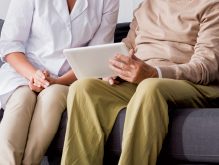 A decline in hormone levels is as inevitable as getting old. Although we cannot do much about aging, we can do something about hormonal imbalance by measuring and replenishing the hormones that have declined.
A decline in hormone levels is as inevitable as getting old. Although we cannot do much about aging, we can do something about hormonal imbalance by measuring and replenishing the hormones that have declined.
Some might think they don’t need any hormones as they don’t feel bad. This is because the decline in hormones is so subtle that we accept it as part of aging. While aging we don’t lose anything noticeable on any given day, yet at to the end we end up with nothing. So the process of hormonal decline is occurring whether we feel it or not.
No one plans to end up with a deficiency in physical or mental function, but many do because they never take the action needed to measure and correct hormonal deficiencies until a noticeable defect occurs. By that time a reversal of a pathological process may not be possible.
Younger Is Coming to Boca
No one plans to end up in a nursing home, but unfortunately many do because they didn’t plan for anything else. Growing old with health and vigor requires a plan that only you can make.
Those who live in Boca Raton are fortunate to have WHCA Center opening there. At this physician-based center, you’ll be able to get your hormones tested and then get them up to where they need to be so you won’t have to feel your age. If we find that all your hormone levels are normal, then this will serve as your baseline for comparison in the future.
Meanwhile, you can start taking simple inexpensive measures like exercise. Increase it over time until you are doing at least 30 minutes of moderate exercise daily. Start eating more vegetables and fruits instead of processed foods. Inactivity may be a sign of thyroid hormone decline. Hypothyroidism may be the reason you feel too tired to go to the gym or walk around the block.
We all know that as we age we’re not able to do what we used to do, but most assume this is normal. Yes, some decline is expected, but much of it is due to decline in our hormones, which starts after age 30, plateaus at 40 and then starts a steep decline, which ends at death. Initially, we stop growing as growth hormone levels declines.
Next to look into may be a need for eyeglasses, the appearance of gray hair, wrinkles or high blood pressure as we experience so called sensory pause, dermatopause and vasculopause respectively. Our hearing or our ability to recover from injury or an illness may also be decreased as we experience a decline in the function of other sensory elements and our immune system.
Other systems such as sex feedback loops responsible for our sex drive also show a similar decline. While we’ve experienced some of these, we don’t make the connection to the whole body hormonal decline. This pattern is referred to as “the pause model of aging and disease.”
The pattern follows a preprogrammed formula of human aging starting after age 30 and ending at death. It happens whether you accept it or not. You may even deny this exists, but you cannot deny that you need eyeglasses to see or you’re losing height because your bones are crumbling due to osteopause.
The problems we associate with aging are in large part due to a decline in hormone production as we age. While we must accept menopause, we may find it hard to admit to the decline in the loss of the male sexual vigor called andropause. We can’t do much about normal aging, but hormonal balance will help us compete longer in the workplace and more effectively. We can feel better by bringing our hormones up to where they were when we were young. The medical professionals at WHCA are uniquely qualified to measure your hormones and replace deficiencies with bio identical ones.
George E. Sadowski, MD, presently the Medical Director of the Wellness & Hormones Centers of America, is a physician with a thriving surgical practice with the Surgical Associates of North Florida in St. Augustine. He received his undergraduate education from the University of Rochester and his medical degree from the prestigious St. George University. Dr. Sadowski has shared his expertise with various hospitals around the country including Greater Baltimore Medical Center and Flagler Hospital. In addition to a fellowship at the Greater Baltimore Medical Center, he has received certifications from both the ACLS and the American Heart Association for his outstanding work in many areas of the medical profession.
5030 Champion Blvd. Suites C-2/C-3
Boca Raton, FL 33496
855.336.1296 | wellnesshca.com
Check Also
Trusted Homecare Agency: Serving Veterans with Free Supplemental Home Healthcare
When it comes to healthcare, veterans deserve the best care possible. For veterans seeking in-home …
 South Florida Health and Wellness Magazine Health and Wellness Articles
South Florida Health and Wellness Magazine Health and Wellness Articles




